人教版初一下学期英语知识点总汇
人教版初中英语七年级下册知识点总结
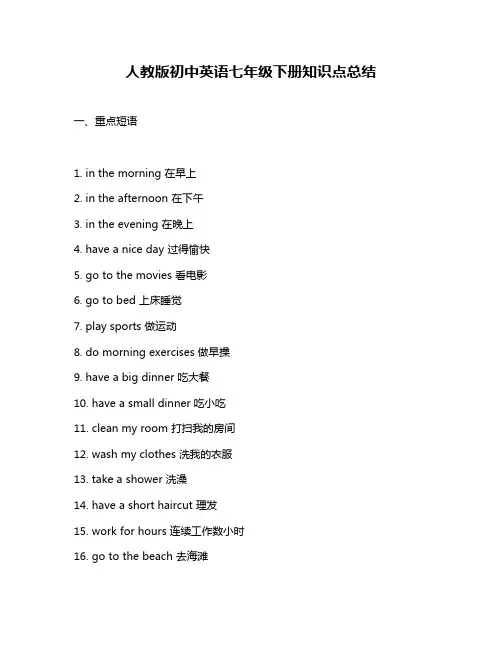
人教版初中英语七年级下册知识点总结一、重点短语1. in the morning 在早上2. in the afternoon 在下午3. in the evening 在晚上4. have a nice day 过得愉快5. go to the movies 看电影6. go to bed 上床睡觉7. play sports 做运动8. do morning exercises 做早操9. have a big dinner 吃大餐10. have a small dinner 吃小吃11. clean my room 打扫我的房间12. wash my clothes 洗我的衣服13. take a shower 洗澡14. have a short haircut 理发15. work for hours 连续工作数小时16. go to the beach 去海滩17. on the weekend 在周末18. listen to music 听音乐19. have a party 举办聚会20. watch TV 看电视21. play computer games 玩电脑游戏22. in the pool 在游泳池里23. go to the zoo 去动物园24. in the mountains 在山里25. have fun 玩得开心26. the great wall 长城27. many places of interest 名胜古迹28. be ready for 为……准备好29. stay healthy 保持健康30. how much 多少31. would you like 一些……吗?32. some noodles 一些面条33. order a pizza 定一个披萨饼34. make a phone order 电话订购35. would you like to do sth 你愿意做某事吗?36. want to do sth 想做某事37. would you like +名词你愿意要……吗?38. would you like +动词不定式你愿意……吗?39. choose some food 选择一些食物40. order the food 订购食物41. be careful 当心;小心42. not much 不多;少量的43. be ready to do sth 准备好做某事。
人教版七年级英语下册各知识点归纳总结
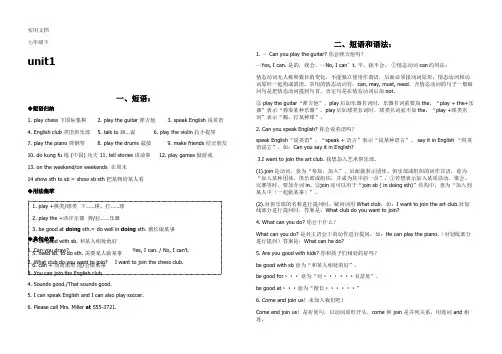
七年级下unit1一、短语:◆短语归纳1. play chess 下国际象棋2. play the guitar 弹吉他3. speak English 说英语4. English club 英语俱乐部5. talk to 跟…说6. play the violin 拉小提琴7. play the piano 弹钢琴8. play the drums 敲鼓9. make friends 结交朋友10. do kung fu 练 (中国) 功夫 11. tell stories 讲故事 12. play games 做游戏13. on the weekend/on weekends 在周末14 show sth to sb = show sb sth 把某物给某人看◆用法集萃◆典句必背1. Can you draw? Yes, I can. / No, I can’t.2. What club do you want to join? I want to join the chess club.3. You can join the English club.4. Sounds good./That sounds good.5. I can speak English and I can also play soccer.6. Please call Mrs. Miller at 555-3721.二、短语和语法:1. — Can you play the guitar? 你会弹吉他吗?—Yes, I can. 是的,我会。
—No, I can’t. 不,我不会。
①情态动词can的用法:情态动词无人称和数目的变化,不能独立使用作谓语,后面必须接动词原形,情态动词和动词原形一起构成谓语。
常用的情态动词有:can, may, must, need。
含情态动词的句子一般疑问句是把情态动词提到句首,否定句是在情态动词后加not。
人教版七年级下册英语语法知识点归纳总结
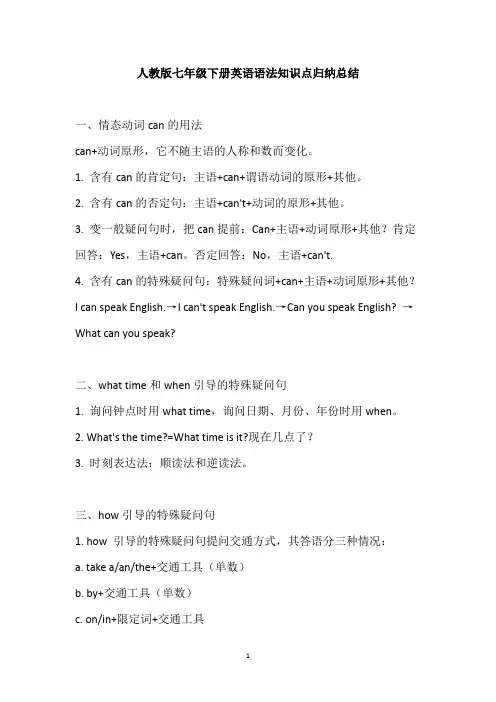
人教版七年级下册英语语法知识点归纳总结一、情态动词can的用法can+动词原形,它不随主语的人称和数而变化。
1. 含有can的肯定句:主语+can+谓语动词的原形+其他。
2. 含有can的否定句:主语+can't+动词的原形+其他。
3. 变一般疑问句时,把can提前:Can+主语+动词原形+其他?肯定回答:Yes,主语+can。
否定回答:No,主语+can't.4. 含有can的特殊疑问句:特殊疑问词+can+主语+动词原形+其他?I can speak English.→I can't speak English.→Can you speak English? →What can you speak?二、what time和when引导的特殊疑问句1. 询问钟点时用what time,询问日期、月份、年份时用when。
2. What's the time?=What time is it?现在几点了?3. 时刻表达法:顺读法和逆读法。
三、how引导的特殊疑问句1. how 引导的特殊疑问句提问交通方式,其答语分三种情况:a. take a/an/the+交通工具(单数)b. by+交通工具(单数)c. on/in+限定词+交通工具---How do you go to school every day?---I take a bus to go to school every day./I go to school by bus every day./I go to school on the bus every day.2. how far 用来提问距离,多远,其答语分为两种:(1)用长度单位表示:It is five kilometers.(2)用时间表示:It’s twenty minutes’walk.3. how long 用来提问时间,意为多久回答常用“for+段时”。
初一英语知识点人教版总结
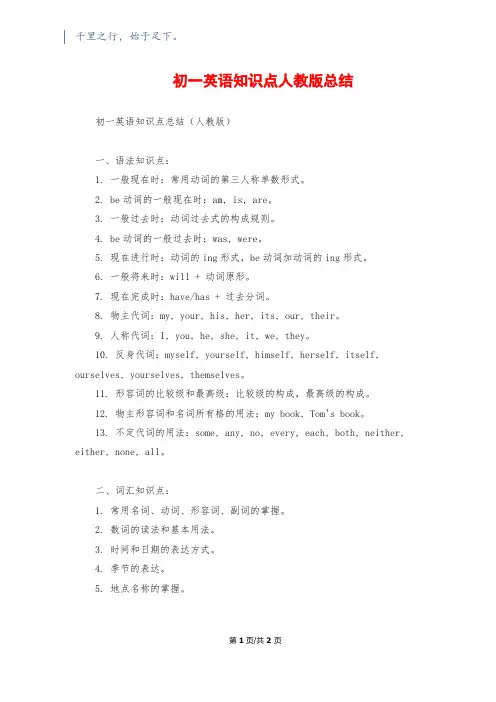
千里之行,始于足下。
初一英语知识点人教版总结初一英语知识点总结(人教版)一、语法知识点:1. 一般现在时:常用动词的第三人称单数形式。
2. be动词的一般现在时:am, is, are。
3. 一般过去时:动词过去式的构成规则。
4. be动词的一般过去时:was, were。
5. 现在进行时:动词的ing形式,be动词加动词的ing形式。
6. 一般将来时:will + 动词原形。
7. 现在完成时:have/has + 过去分词。
8. 物主代词:my, your, his, her, its, our, their。
9. 人称代词:I, you, he, she, it, we, they。
10. 反身代词:myself, yourself, himself, herself, itself, ourselves, yourselves, themselves。
11. 形容词的比较级和最高级:比较级的构成,最高级的构成。
12. 物主形容词和名词所有格的用法:my book, Tom's book。
13. 不定代词的用法:some, any, no, every, each, both, neither, either, none, all。
二、词汇知识点:1. 常用名词、动词、形容词、副词的掌握。
2. 数词的读法和基本用法。
3. 时间和日期的表达方式。
4. 季节的表达。
5. 地点名称的掌握。
第1页/共2页锲而不舍,金石可镂。
三、句型知识点:1. 陈述句的基本句型:主语+谓语+宾语。
2. 疑问句的基本句型:助动词/系动词/情态动词+主语+动词?3. 否定句的基本句型:主语+助动词/be动词/情态动词+not+动词原形。
4. be动词的疑问句和否定句的构成。
5. 以What/Who/Where/When/How开头的特殊疑问句的构成。
四、阅读技巧和写作要点:1. 阅读理解题的解题技巧。
2. 写作要点:选择合适的词汇和句型,注意语法和拼写错误,组织结构和内容的连贯性。
人教版七年级下册英语各单元知识点归纳
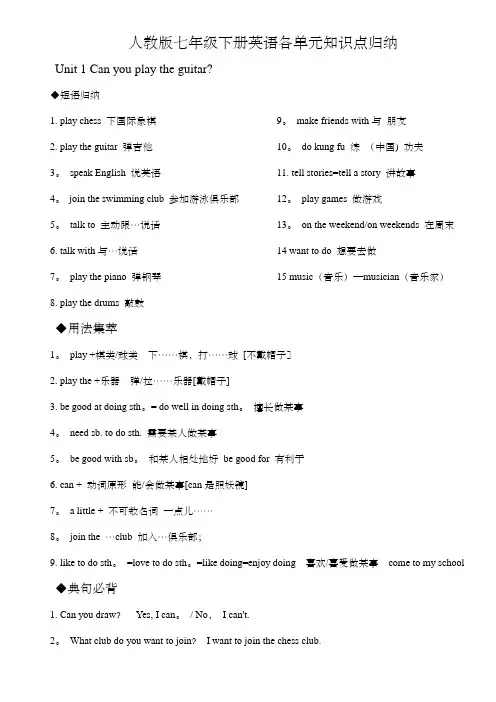
5。be good with sb。和某人相处地好be good for有利于
6. can +动词原形能/会做某事[can是照妖镜]
7。a little +不可数名词一点儿……
8。join the…club加入…俱乐部;
9. like to do sth。=love to do sth。=like doing=enjoy doing喜欢/喜爱做某事come to my school
6 No+doing或者No+名词,例如No swimming!No photos!
Unit 5 Why do you like pandas?
◆短语归纳
1. kind of = a little有几分,有点儿,修饰形容词,表示程度
14 want to do想要去做
15 music(音乐)—musician(音乐家)
◆用法集萃
1。play +棋类/球类下……棋,打……球[不戴帽子]
2. play the +乐器弹/拉……乐器[戴帽子]
3. be good at doing sth。= do well in doing sth。擅长做某事
6. It is + adj. + to do sth.做某事是….It是形式主语,不定式是真正的主语
7. Thanks for + n。/ doing感谢你(做)某事。He is like a father to me.【like】是介词,表示“像"8 What do you think of the movie?=How do you like the movie?你认为这部电影总么样?
人教版七年级下册英语各单元知识点总结归纳
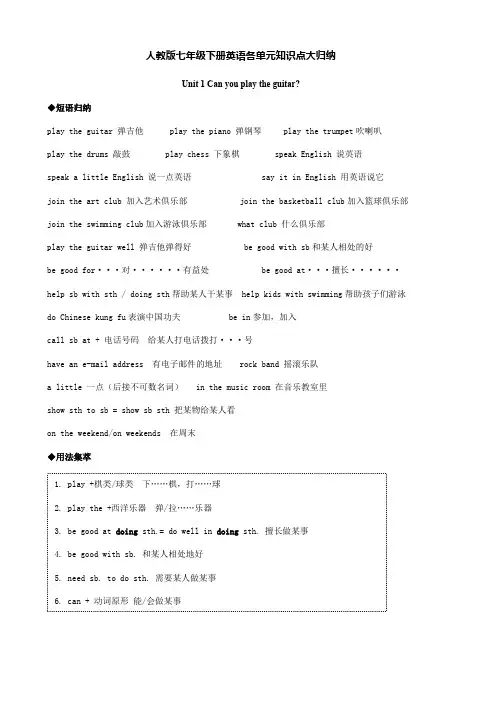
人教版七年级下册英语各单元知识点大归纳Unit 1 Can you play the guitar?◆短语归纳play the guitar 弹吉他 play the piano 弹钢琴 play the trumpet吹喇叭play the drums 敲鼓 play chess 下象棋 speak English 说英语speak a little English 说一点英语 say it in English 用英语说它join the art club 加入艺术俱乐部 join the basketball club加入篮球俱乐部join the swimming club加入游泳俱乐部 what club 什么俱乐部play the guitar well 弹吉他弹得好 be good with sb和某人相处的好be good for···对······有益处be good at···擅长······help sb with sth / doing sth帮助某人干某事 help kids with swimming帮助孩子们游泳do Chinese kung fu表演中国功夫 be in参加,加入call sb at + 电话号码给某人打电话拨打···号have an e-mail address 有电子邮件的地址 rock band 摇滚乐队a little 一点(后接不可数名词) in the music room 在音乐教室里show sth to sb = show sb sth 把某物给某人看on the weekend/on weekends 在周末◆用法集萃1. play +棋类/球类下……棋,打……球2. play the +西洋乐器弹/拉……乐器3. be good at doing sth.= do well in doing sth. 擅长做某事4. be good with sb. 和某人相处地好5. need sb. to do sth. 需要某人做某事6. can + 动词原形能/会做某事◆语法can 能;会;可以【用法】它本身有一定的含义,没有人称和数的变化,但不能单独作谓语,要和动词原形一起构成谓语。
人教版七年级英语下册总复习知识点考点总结归纳
人教版七年级英语下册总复习知识点考点总结归纳人教版七年级英语下册知识点1. across from ……在……的对面 across from the bank 在银行的对面2. next to……紧靠…… next to the supermarket 紧靠超市3. between……and……在……和……之间between the park and the zoo 在公园和动物园之间among 表示位于三者或三者以上之间4. in front of……在……前面 There is a tree in front of the classroom. 课室前面有棵树。
in the front of……在……(内)的前部 There is a desk in the front of the classroom.课室内的前部有张桌子。
5. behind……在……后面 behind my house 在我家后面6. turn left/ right 向左/右拐on the left/right of……在某物的左/右边 on the left of our school 在我们学校的左边on one’s left/right 在某人的左/右边 on my left在我左边7. go straight 一直走8. down /along……沿着……(街道 down/along Center Street 沿着中央街9. in the neighborhood=near here 在附近10 welcome to……欢迎来到……11. take /have a walk 散步12. the beginning of…………的开始,前端at the beginning of……在……的开始,前端in the beginning 起初,一开始13. have fun=have a good time=enjoy oneself 玩得开心,过得愉快14. have a good trip 旅途愉快15. take a taxi 坐出租车16. 到达:get to +地方get here/ there/ home 到这/那/家 arrive in +大地方 I arrive in Beijing. arrive at +小地方I arrive at the bank. reach +地方17.go across 从物体表面横过 go across the street横过马路go through 从空间穿过 go through the forest穿过树林18.on + 街道的名称。
人教版人教版七年级下册英语知识点复习(完整版)
人教版人教版七年级下册英语知识点复习(完整版)Unit 1 Can you play the guitar?1.Can do is equivalent to be able to do when used with a modal verb and a verb in its base form.e the definite article "the" when XXX.e "join" when XXX。
n。
or group.4.Say is used to express the content of a message。
while speak is used to express the language in which the message is XXX。
and tell is used to XXX.5."Want" can be replaced with "would like" when making a request for someone to do something.6."Too" is used in affirmative sentences with a comma before it。
while "either" is used in negative sentences with a comma before it。
"Also" is used after the verb "be," and "as well" is used in spoken language without a comma before it.7."Be good at" is used to XXX or activity。
新人教版七年级下册英语各单元知识点总结
新人教版七年级下册英语各单元知识点总结Unit 1 Can you play the guitar?1,情态动词+V 原can do= be able to docan 的用法歌诀can 可用来表力量,但与实动不分别。
不管主语何变换, can 的模样永不变。
只要句中消灭 can,动词原形后面站。
一般疑问 can 提前,否认 can 后not 添。
2, Play+ the+ 乐器 play the violin/piano/drums (乐器前加 the)Play +球类,棋类play football play chess (球类和棋类前省略 the)3,join 参与社团、组织、团体take part in :参与运动、活动 join sb. 参加某人4, 4 个说的区分:say+内容:say it in English 用英语说它speak+语言: speak English 说英语talk 谈论 talk about sth. 谈论某事 talkwith/to sb 和某人交谈tell 告知,表达tell sb. (not)to do sth告知某人(不)去做某事(tell a story)tell stories/ jokes 讲故事/笑话5, want 的用法:想要(动词)(1) want to do sth.= would like to do sth 想要做某事(2) want (sb)to do sth.= would like +(sb)to do sth 想要做某事6, 4 个也的区分: too 确定句末(前面加逗号)either 否认句末(前面加逗号)also 句中,放在实意动词前, be 动词和情态动词之后as well 口语中(前面不加逗号)7, be good at =do well in+ V-ing/N. 擅长于(做)…… be good at playing soccer用法拓展:be good for 对…有益(be bad for 对…有害)be good to 对…友好(good 可用 friendly,nice,kind 替换)be good with 和…相处好=get on/ along well with8,特别疑问句的构成:疑问词+一般疑问句9, How/ what about+V-ing …怎么样?(表建议)What about playing basketball ? 10,感官动词(look, sound, taste, smell, feel)+adj/ like11.选择疑问句:答复不能直接用 Yes 或者 No,要从中选择一个答复Can you play the piano,,the drums,or the guitar? Ican play the drums.你会弹奏钢琴,敲鼓,或者弹吉他吗?我会打鼓12,students wanted for school show 学校演出招募学生(wanted 表示招募,含有被动意义)13,show sth to sb=show sb sth 给某人看某物 show me your book=show your book to me on show,意为“在展出”give sth to sb=give sb sth 给某人某物give me a pen =give a pen to me14,help sb (to)do sth 帮助某人做某事help sb with sth 帮助某人某事with sb’s help= with the help of sb 在某人的帮助下help oneself to 任凭享用15,be busy doing sth= be busy with sth 忙于做某事,be busy doing his homework= be busy with his homework 忙于他的家庭作业116,sb. need to do sth 某人需要做某事 need sb. to do sth 需要某人做某事17,be free= have time 有空的be busy 劳碌的18,make friends 交朋友 make friends with sb.与某人交朋友19,call sb at +电话号码给某人打---电话20,on the weekend= on weekends 在周末21,English-speaking students 说英语的学生(带有连词符,有形容词性质)22,do kung fu 表演功夫23,in, on 和at 在表达时间方面的区分①in+年、月、季节;泛指在上午,下午,晚上,如: inthe morning(afternoon, evening). in spring 在春季in September 在九月②on 指在某一天或某一天的上午,下午,晚上,具体到某一天、节日如: on Monday, on Sunday afternoon, on July 1, 1999 on New Year’s Day③at,一般表示点时间,如 at six o’clock, at three thirty.、习惯用法: at night, at noon,留意:在英语中,假设时间名词前用 this, last, next 等修饰时,像这样的表示,“在某时”的时间短语前,并不需要任何介词。
人教版七年级英语下册单元知识点总结(全册)
人教版七年级英语下册单元知识点总结(全册)Unit 1 Can you play the guitar?一短语归纳1.speak English/Chinese 说英语/汉语2. what club /sports什么俱乐部/运动3.play the guitar/ piano/drums/ violin 弹吉它/弹钢琴/敲鼓/拉小提琴4. play chess/ basketball/ volleyball/ soccer 下国际象棋/ 打篮球/排球/足球5.tell stories讲故6. the art/chess/swimming/sports/ story telling/English club艺术/国际象棋/游泳/体育/讲故事/英语俱乐部7.school show 学校演出8.sound good听起来不错9.teach music 教音乐10.do kung fu练(中国) 功夫11.make friends(with sb.)(结交朋友)12.on the weekend/on weekends在周末e and show us来给我们表演15.write stories写故事16.after school放学后17.English-speaking students说英语的学生18.play games 做游戏19.the Students’ Sports Center学生运动中心20.at the old people’s home在老人之家21.be in our school music festival 参加学校音乐节22.jion the music club加入音乐俱乐部二用法集萃1. play +棋类/球类下……棋,打……球2. play the +乐器弹/拉……乐器3. be good at doing sth.擅长做某事be good for.. 对… 有好处be good /kind to … 对… 友好4. be good with sb. 和某人相处地好; 善于应付(处理)…5. need(sb./sth.)to do… 需要(某人/某物)做….6. can + 动词原形能/会做某事7. a little + 不可数名词: 一点儿……9. like to do sth.或like doing sth. 喜欢做某事10.want to do…想做……11.What about…?…怎么样?(后面接Ving/代词/名词)12. talk用法: talk to/with sb. 跟某人说话talk about sth. 谈论某事tell 用法:tell sb sth. 告诉某人某事tell sb to do sth 告诉某人去做某事tell stories 讲故事say用法:say直接加说话的内容/itspeak用法:speak +语言13.help sb. with sth在某方面帮助某人= help sb.(to)do sth14.be free /busy有空/很忙15. call sb. at+号码拨打某人的……号码16. be in=join …成为…中的一员(P6)17.want …for the school show为学校表演招聘……三典句必背1. Can you draw? 你会画画吗?Yes, I can. / No, I can’t.是,我会。
- 1、下载文档前请自行甄别文档内容的完整性,平台不提供额外的编辑、内容补充、找答案等附加服务。
- 2、"仅部分预览"的文档,不可在线预览部分如存在完整性等问题,可反馈申请退款(可完整预览的文档不适用该条件!)。
- 3、如文档侵犯您的权益,请联系客服反馈,我们会尽快为您处理(人工客服工作时间:9:00-18:30)。
人教版新目标英语七年级(下)各单元知识概要Unit 1 Where’s your pen pal from?一、词组be from= come form 来自...pen pal=pen friend 笔友like and dislike 好恶;爱憎live in….在...居住speak English 讲英语play sports 做体育运动a little French 一些法语go to the movies 去看电影an action movie 一部动作片on weekends 在周末Excuse me 对不起,打扰get to 到达、抵达beginning of 在...开始的时候at the end of 在...结束的时候arrive at /二、句型(1)、Where主+be+主语+from?主语+be+from+地点.(2)、Where do/does+主语+live?主语+live/lives in…(3)、What language do/does +主语+speak?主语+speak/speaks….(4)、主语+like/likes+doing…三、日常交际用语1-Where is your pen pal from?-He’s from China.2-Where does she live?--She lives in Tokyo.3-Does she speak English?-Yes,she does/No,she dosen’t.4-Is that your new pen pal?-Yes,he is /No,he isn’t.5-What language does she speak?-She speaks English.Unit 2 Where’s the post office一、词组post office 邮局pay phone 投币式公用电话next to 在...隔壁across from 在...对面in front of 在...前面between…and… 在...和...之间on a street 在街上in the neighborhood 在附近on the right/left 在右边/在左边on one’s right/left 在某人的右边/左边turn right/left 向右/左转take a walk 散步have fun 玩得开心the way to …去...的路take a taxi 打的/乘出租车go down(along)…沿着...走go through...穿过...have a good trip 旅途愉快二、句型(1)、Is there a bank near here?Yes,there is .It’s on Centre Str eet.No,there isn’t.(2)、Where’s the sumpermarket?It’s next to the library.(3)、Bridge Street is a good place to have fun.(4)、I hope you have a good trip.(5)、If you are hungry,you can buy food in the restaurant.(6)、Talk a walk though the park..(7)、enjoy后接名词或动词-ing形式.Do you enoy(=like) your work?Do you enjoy(=like) living in the city?三、日常交际用语(1)、Is there a ….?句型Eg:-Excuse me.Is there a hotel in the neighborhood.-Yes, there is. No.there isn’t(2)、Where is …?句型Eg:-Where is the park,please?-It’s behind the bank.(肯定回答)-I’m sorry I don’t know. (否定回答)(3)、Which is the way to +地点? 句型.例如:- Which is the way to the library.(4)、How can I get to +地点?句型.例如:-How can I get to the restaurant?(5)、Can you tell me the way to +地点?句型.例- Can you tell me the way to the post office?(6)、Let me tell you the way to my house.(7)、Just go straight and turn left.Unit 3 Why do you like koalas?一、词组want to do sth .想要做某事want sb to do sth 想要某做某事want sth 想要某物Let sb do sth 让某人做某事kind of 有几分\种类a kind of 一种……years old …年龄如:ten years old 十岁like to do sth 喜欢做某事like doing sthplay with … 与...一起玩be quiet 安静during the day 在白天at night 在夜间have a look at.. 看...one…the other 一个...另一个...二、句型(1)、-why do you like pandas?-Because they’re very cure.(2)、-Why dose he like koalas?-Because they are kind of interesting. (3)、-Where are lions from?-Lions are from South Africa.(4)、-What animals do you like?-I like elephants.三、日常交际用语(1)、-Let’s see the lions.(2)-Why do you want to see the lions?-Becase they are very cute.(3)-Do you like giraffes?Yes,I do./ No,I don’t(4)-What other animal do you like?_I like dogs.tooother+ 名词的复数.表示没有特定的数量范围the other+名词的复数表示有特定的数量范围.(5)-Why are you looking at me?-Because you are very cute.(6)-Let us play games. –Great!Let me see.Unit 4 I want to be an actor.一、词组want to be+职业想要成为。
shop assistant 店员bank clerk 银行职员work with 与。
一起工作work hard 努力工作work for 为。
而工作work as 作为。
而工作get.. from…从。
获得。
give sth.to.sb /give.sb.sth 把某物给某人正确的表示:give it/them to sb.错误的表示:give sb.it/themin the day 在白天at night 在夜间talk to /with 与…讲话go out to dinners 外出吃饭in a hospital 在医院newspaper reporter 报社记者movie actor 电影演员二、句型(1)-What do/does+某人+do?例:-What do you do?-I’m a student.-What dos e he do? He’s a teacher.(2)-What do/does+某人+want to be?例:What do you want to be?-I want to be a teacher. -What does she want to be ?She want to be a nuser.(3)-Where does your sister work?-She works in a hospital.(4)-Does he work in the hospiatYes.he does/No,he doesn’t(5)-Does she work late?-Yes,she does/No.she doesn’t(6)-英语中询问职业的几种表达方式:What do/does …do?What is…? What is your father?What’s one’s job?例:What’s your father’s job?Unit 5 I’m watching TV.一、词组do homework 做家庭作业watch TV 看电视eat dinner 吃饭;就餐clean the room 打扫房间read newspaper/a book 看报纸/看书go to the movies 看电影write a letter 写信wait for 等待;等候talk about 谈论。
play basketball/soccer/ 打篮球/踢足球take photos 拍照TV show 电视节目Some of。
中的一些a photo of my family 我的家庭照at school 在学校be with 和。
一起in the tree 在树上二、句型(1)-What+be+主语+doing? ….正在做什么?-主语+be+doing。
…正在做某事。
例:-what are you doing?-I’m doing my homework.(2)-Thanks for … 为。
而感谢例:Thanks for your letter.(3)-Here are/is…例:Here are some of my photos.Here is a photo of my family.(4)-That sounds good.(5)-This TV show is boring.三、日常交际用语(1)-Do you want to go to the movices? –Sure.(2)-When do you want to go? –Let’s go at seven.(3)-Where do people play basketball? –At school.(4)-What’s he waiting for?-He’s waiting for a bus.(5)-What’s he reading? He’s reading a newspaper.1)现在在进行时的形式是:助动词be(am,is,are)+动词-ing形式(也叫现在分词),表示现在(说话的瞬间)正在进行或发生的动作。
